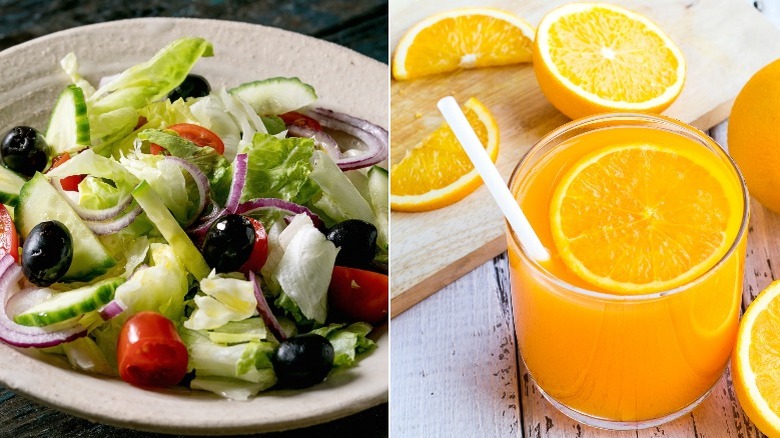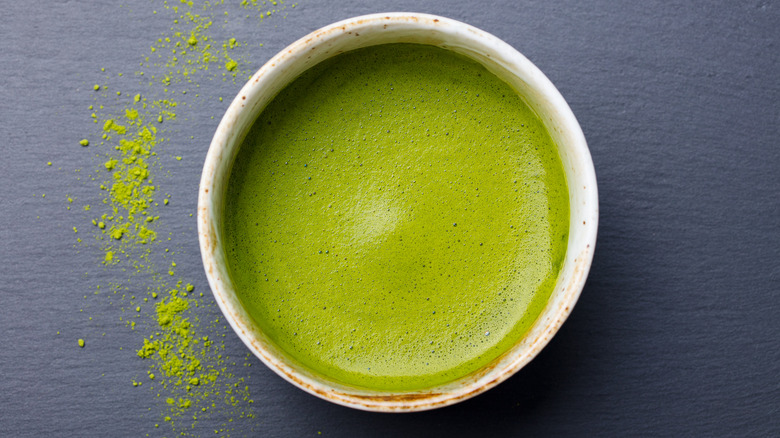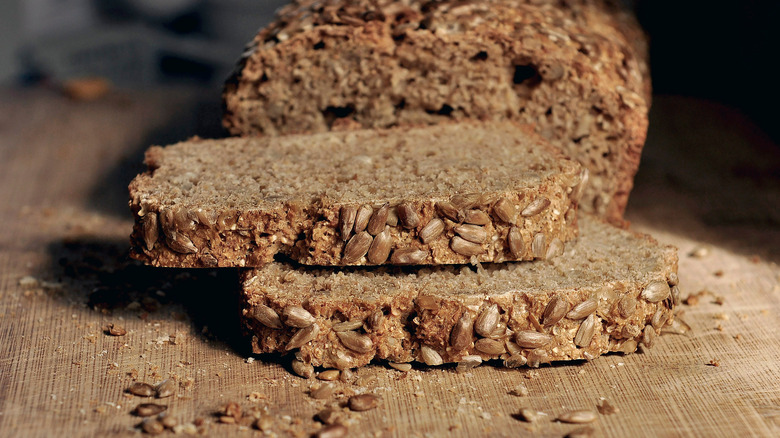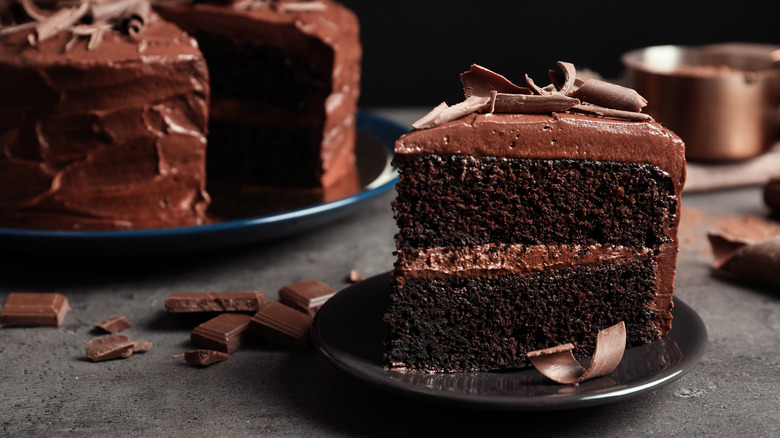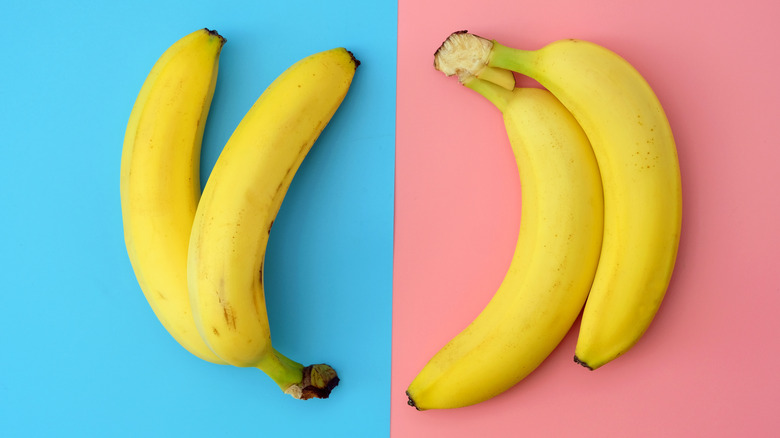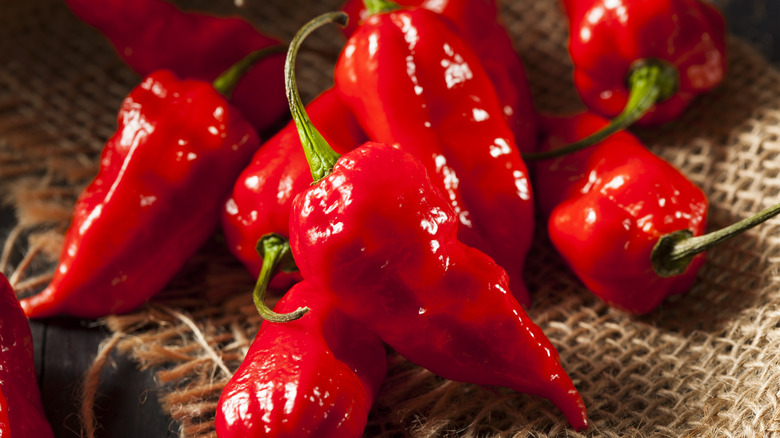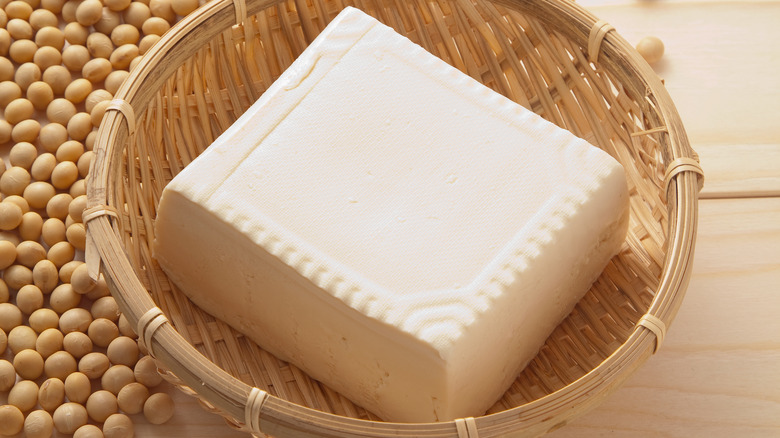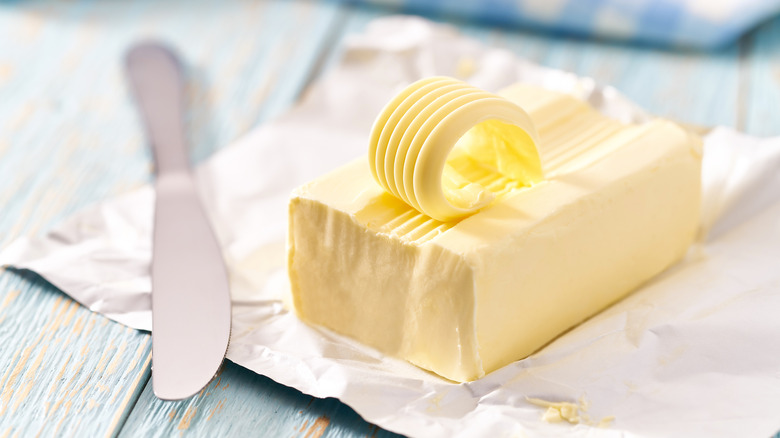7 Foods To Eat And 7 To Avoid When You Have Crohn's Disease
It's not unusual for the same ailment to vary from person to person. Take the common cold, for example. While you may feel a little congested while sick, one of your friends could be completely clogged up or constantly sneezing. The same is true when it comes to the inflammatory bowel disease (IBD) known as Crohn's disease.
As the Mayo Clinic explains, all cases of Crohn's disease have one thing in common: inflammation in the digestive tract. This means that both of your intestines, as well as your colon, can be affected. Now, keep in mind that typically only certain parts of the digestive tract become inflamed by this form of IBD. For one person, the intestines might become irritated while for someone else, it could be only the colon that is affected. So, not surprisingly, one person with Crohn's disease could have flare-ups that involve diarrhea while someone else could, over time, develop a bowel obstruction.
Unfortunately, there's no cure at this time for Crohn's disease, and science has not yet pinpointed why some people develop it and others don't (via Mayo Clinic). But that doesn't mean a person can't manage this condition and even have periods of remission from their symptoms. As we'll explore, diet can help with Crohn's disease; however, finding the right combination of foods can be tricky. Yes, like the symptoms of Crohn's disease, what foods work and don't work during both flare-ups and remission can be different for everyone.
Eat: Eggs
Okay, here's the bad news. As registered dietitian Kelly Kennedy told Everyday Health, "Crohn's can be super frustrating because there's no one specific diet that works for everyone." Plus, Kennedy pointed out that "the foods that work for you can change over time." With that said, certain foods have a good track record when it comes to helping Crohn's patients get the nutrients they need without exacerbating their symptoms.
Case in point: eggs. They are packed with minerals like calcium, selenium, zinc, and phosphorus (via Keck Medicine of USC). Plus, they contain vitamins E, K, D, and A, as well as several of the B vitamins. But what's especially crucial for someone with Crohn's is eggs have lean protein (via Everyday Health). Why is this important? Well, as the Crohn's & Colitis Foundation's website explains, lean sources of protein are usually easier for a Crohn's patient to process. And since malnutrition is a concern for someone managing Crohn's disease, it's essential that a person with this condition eat the right amount of protein every day.
In addition to eggs being a good food choice for Crohn's disease patients, they also might help with cholesterol (via Keck Medicine of USC). Yes, despite concerns about eggs raising cholesterol, more recent data supports that eating eggs can actually increase your body's levels of high-density lipoprotein (aka the good kind of cholesterol). However, before adding more eggs to your diet, you should check with your health care professional.
Avoid: Raw vegetables and fruit juices with pulp
As the Crohn's & Colitis Foundation's website points out, a wide variety of vegetables can be helpful when Crohn's is in remission. However, they can be problematic during flare-ups (via Cleveland Clinic). This brings us to another point: food preparation. If you have Crohn's, then raw, unpeeled vegetables are more likely to irritate your system than cooked, skinned ones. Similarly, skinless fruit is a better option, and fruit juices with pulp aren't recommended during flare-ups (via Medical News Today). You'll also want to remove the seeds from fruits and your vegetables before eating them.
Although some fruits and vegetables may be entirely okay for Crohn's patients, others are more debatable. For example, registered dietitian Anne Taylor advises against eating cabbage since it can cause gas (via Cleveland Clinic). You may also find canned pears easier on your stomach than raspberries or apples, according to the Clinic.
Drink: Green tea
Animal studies have shown that green tea may be good for inflammation in the colon and thus potentially beneficial for those with Crohn's disease (via Healthline). Although more research — especially research on humans — is needed on green tea's impact on the digestive tract, there is a working theory as to why green tea might be beneficial for Crohn's disease.
Like many plants, green tea contains a substance called polyphenols, according to Healthline. These compounds not only have antioxidant properties but also might have an anti-inflammatory effect on the body. In fact, one study concluded that the types of polyphenols in green tea might have a similar impact on inflammation as the medication sulfasalazine, which is prescribed for inflammation in the bowels, according to a study in Frontiers in Immunology. Despite these promising findings, you should still speak with your health care professional before adding more green tea to your diet.
Avoid: Corn
You may be surprised to learn that corn is not actually a vegetable. As Verywell Fit notes, corn is a member of the whole grain family of foods. But even though corn is often paired with veggies (which, when prepared properly, can be helpful for Crohn's that's in remission), it's not a good choice for Crohn's disease patients during flare-ups (via Health).
Foods like corn that are more difficult for your body to process can cause problems, especially during a flare-up. "Anything that's really rough to digest would possibly be detrimental and cause more symptoms and possibly slow the healing process," nutritionist and Crohn's patient Tracie Dalessandro told Health. Additionally, registered dietitian Keren Gilbert advises cutting back on corn and other foods that have large amounts of insoluble fiber (via Everyday Health). Unfortunately, this mean popcorn is off the table, too.
It is important to remember that corn has a number of nutrients, including zinc, potassium, iron, magnesium, and vitamins A, C, and E (via Verywell Fit). So, if you find you need to cut out corn from your diet, make sure to get those vitamins and minerals from a different source.
Eat: Meat alternatives
Plant-based meat alternatives have been gaining popularity. Why? Well, despite not containing meat, companies are able to craft something close to foods like steak and burgers (Everyday Health). Does that mean you won't be able to tell the difference between meat and meat alternative products? Truthfully, a great deal of how close they get to fooling your senses depends on the manufacturer. But even if you can detect a difference, plant-based "faux meat" might be worth adding to your diet if you have Crohn's disease.
As Everyday Health notes, red meat and Crohn's disease can be a bad combination. Specifically, traditional steaks, burgers, and other red meat-based foods can cause a Crohn's patient's gastrointestinal tract to become inflamed. And since the GI tract is made up of your stomach and intestines, it's not hard to see why swapping out red meat for plant-based substitutes could help you control your Crohn's symptoms.
Although meat alternatives can be tasty substitutes for some of your favorite foods, they can lack important vitamins found in red meat, like vitamin B12 (via Everyday Health). Now, this doesn't mean they have no nutritional value. In fact, one study found such plant-based products contain important nutrients like iron and folate (via WebMD). However, that same study also concluded it had less vitamin B12 and zinc. Because of this, the study's lead researcher Lisa Harnack recommends reading food labels to make sure you're getting what you want from your meat alternatives.
Avoid: Alcohol
If you're someone who enjoys an occasional beer or glass of wine, then don't worry. Yes, alcohol can exacerbate Crohn's disease symptoms but that doesn't mean you necessarily have to cut it out of your diet entirely. However, that doesn't mean you should go on a bender like the characters from "The Hangover" (even if a tiger isn't involved).
As Dr. Garth Swanson, the director of the Crohn's and Colitis Center at Rush University Medical Center, told WebMD, alcohol actually stifles your immune system. While this can be bad for someone fighting off an ailment, it can help with Crohn's since at the center of this inflammatory bowel disease is an overactive immune system. But Dr. Swanson cautioned, "If you're in an active flare, I would not recommend drinking alcohol." When in remission, you should still only drink in moderation, he advised.
Besides alcohol possibly causing issues during a flare-up, it also can interact with medications used to treat Crohn's disease (via WebMD). These include immunomodulators, which, like alcohol, repress the immune system (via Everyday Health). But the similarities between alcohol and this type of medication don't end there. Both can cause liver damage, so taking immunomodulators and consuming alcohol is upping your odds of developing liver issues.
Eat: Almond products
From cookies to garnishes for fish, almonds are incredibly versatile members of the nut family. As Health explained, "Nuts are an excellent source of good fats, vitamin E, and protein, but digesting them presents an insurmountable challenge to most people with Crohn's. You can get the benefits of nuts without aggravating symptoms by eating nut butters."
Although peanut butter is arguably the best known of the nut butters, almond butter in many ways is healthier. As Medical News Today explains, it has approximately half the sugar (depending on the brand), and more calcium, magnesium, potassium, and phosphorous than its peanut cousin's spread. And for someone with Crohn's disease, almond butter can be especially helpful since it packs twice as much fiber as peanut butter, which can aid in keeping you regular. However, you'll want to stick with smooth varieties, advised Health.
Besides almond butter, almond milk is another product to consider for your Crohn's-friendly diet. According to Health, Crohn's patients are more likely to become lactose intolerant, which can mean missing out on a source of calcium. But as registered dietitian Cynthia Sass pointed out, manufacturers sometimes choose to add calcium as well as vitamin D to almond milk (via Health). Nevertheless, you should compare different brands in order to find one with the most nutrients and least amount of sugar and preservatives.
Avoid: Whole grains
When it comes to Crohn's disease and grains, a great deal of what you've heard now for years goes out the window. For example, if you were asked which is healthier, white bread or wheat bread, you'd probably say the wheat bread. However, for someone with Crohn's disease those whole grains in products like bread and pasta can be the wrong choice, especially during a flare-up (via Verywell Health).
According to Healthline, the very thing that usually makes whole grains so healthy — high fiber content — is why they can cause problems for someone with Crohn's. Specifically, fiber can be an issue when it comes to inflammation in the digestive tract, which is why some doctors recommend a low-fiber diet to help manage Crohn's disease symptoms. Is this for everyone? No. In fact, there is some debate about cutting down on fiber if you have Crohn's. That is why you should involve your health care professional in your meal planning.
In addition to products made from whole grains, Crohn's patients should think about reducing how much brown and wild rice they consume (via Verywell Health). White rice can be a good alternative depending on your health needs. Or if you want a different side dish with dinner, you might want to consider swapping out rice pilaf for polenta or potatoes (via Healthline).
Drink: Electrolyte drinks
For some people with Crohn's disease, their condition progresses to where they need to have at least some of their large intestine surgically removed (via Verywell Health). And even if this surgery is successful, living without part or all of your intestine means your body will have a more difficult time taking in water. This, of course, can lead to dehydration and constipation, and while it's important to replenish those lost fluids and electrolytes, you still need to be careful what products you use to do so.
Let's start with one of the most common electrolyte drinks: sports drinks. On the surface, they seem like a good choice since they were designed for athletes (via Verywell Health). Well, like so many manufactured foods, these drinks all have their own formulas, which can include artificial food coloring, caffeine, sugar, and artificial sweeteners. And if you guessed that these are not great for your body if you have an irritable bowel disease like Crohn's, you'd be right. Fortunately, there is a DIY solution.
According to the United Ostomy Association of America, a combination of frozen orange juice, baking soda, salt, water, and white Karo syrup can give you an all-natural, effective drink for replenishing your electrolytes (via Verywell Health). For those unfamiliar with Karo syrup, it's a type of corn syrup that has been used to help with constipation, per Medical News Today.
Avoid: Sugary and sugar-free foods
It's rare that sweet treats like cakes make any "healthy" foods list. So, not surprisingly, if you're having a flare from Crohn's disease, then drinking soda and snacking on candy and ice cream may exacerbate your symptoms (via Brigham & Women's Crohn's & Colitis Center). But if you're thinking "okay, I'll just switch to the sugar-free version of my favorite treats," think again.
According to the Brigham & Women's Crohn's & Colitis Center, the reason why foods labeled as "sugar free" can still have a sweet taste is because they are made with sugar alcohols. And they can pose a problem for someone experiencing a Crohn's disease flare up.
In particular, if you have Crohn's disease, you should avoid or greatly limit foods made from maltitol, a sugar alcohol commonly found in ice creams and desserts (via Brigham & Women's Crohn's & Colitis Center). Another no-no especially if you're having a flare-up is sorbitol, which comes from corn syrup and is used in sugar-free chewing gums and candy. And speaking of chewing gums, be aware of another sugar alcohol they contain: xylitol (aka "wood sugar"), advises Yale New Haven Health.
Eat: Bananas
Bananas can actually help with one of the most common symptoms of Crohn's disease: diarrhea (via Medical News Today). But anyone familiar with the BRAT diet will probably not find this surprising.
Now, don't let the name fool you. The "BRAT" in the BRAT diet has nothing to do with a rude child. It's an acronym for bananas, rice, applesauce, and toast and it is used to help with diarrhea, as explained in a study published in StatPearls. The reason bananas are part of this special diet (and might be good for a Crohn's patient's diet plan) is because they have fiber and water. In addition, Crohn's patients can lose electrolytes like potassium during a flare-up involving diarrhea. Fortunately, bananas are an excellent source of not just potassium but also other nutrients like folate and vitamin C.
Although bananas can help naturally treat Crohn's disease-related diarrhea, that doesn't mean you should stuff yourselves with these appealing fruits (sorry, we couldn't resist a banana pun). As Medical News Today recommends, stick to eating small amounts of banana at a time.
Avoid: Spicy foods
Before we explore spicy foods' effect on Crohn's patients, it's important to remember that Crohn's is a type of irritable bowel disease (IBD). As Dr. Edwin K. McDonald IV explained on The University of Chicago Medical Center's website, foods with a kick can "trigger some symptoms" in different forms of IBD, including Crohn's.
According to Dr. McDonald, more than one study has found evidence that spicy foods and digestive issues are a bad combination. For example, one study concluded that there is a connection between spicy foods and irritable bowel syndrome (IBS), as well as upper gastrointestinal issues for people with indigestion. In addition, two of the complications from Crohn's — ulcers and fissures — can be irritated by spices.
Although spicy foods can be problematic for Crohn's patients, Dr. McDonald cautions that everyone should be careful when trying something spicy. He cited a case from The Journal of Emergency Medicine, in which a man damaged his esophagus from eating a bhut jolokia. Also known as the ghost pepper, this member of the chili pepper family is said to be two to three times spicier than a habanero pepper.
Eat: Tofu
From miso soup to the infamous tofurky, tofu is a well-known soy product that ranges from silken to super firm in texture (via Health). But even if you're not its biggest fan, you might want to give it another try especially if you have Crohn's disease.
According to the Iowa Clinic, people with irritable bowel diseases, like Crohn's, should stick to lean proteins. And as registered dietitian nutritionist Summer Yule explained to Health, tofu is "a rich source of lean plant-based protein." In fact, certified dietitian nutritionist and registered dietitian Tanya Freirich takes this one step further in her statement to Health, saying, "Tofu is an excellent source of protein — in fact, it is a rare vegan choice that is a complete source of protein, which means it contains all nine amino acids."
Besides being a good protein choice for individuals with Crohn's, some research has found soy products might help support cognitive function, as well as help manage high cholesterol and decrease the chances of developing coronary heart disease (via Health). However, there are also some concerns regarding soy. One study's findings suggest that soy might raise the odds of developing aggressive prostate cancer. Nevertheless, tofu is rich in a number of minerals, including iron, zinc, copper, and magnesium, so it's worth discussing whether or not it's a good fit for your Crohn's diet plan with your health care professional.
Avoid: Butter
Imagine this: It's movie night, and your friend is making a big bowl of popcorn with actual butter instead of an imitation butter flavoring. Sounds good, right? But if your friend has Crohn's disease, this popular snack is probably not a good idea — not just because of the popcorn but also because of the butter (via WebMD).
As Healthline explains, butter made from cow's milk is rich in quite a few vitamins, including K2, E, D, B12, and A. But it's also made up of around 80% fat, 70% of which is saturated fatty acids. And, if you guessed that foods that are high in fat are major no-no's when it comes to Crohn's disease, then you'd be 100% right (via WebMD). In fact, the Crohn's & Colitis Foundation's website lists butter as a possible trigger food for Crohn's symptoms, making it an especially bad choice during a flare-up.



